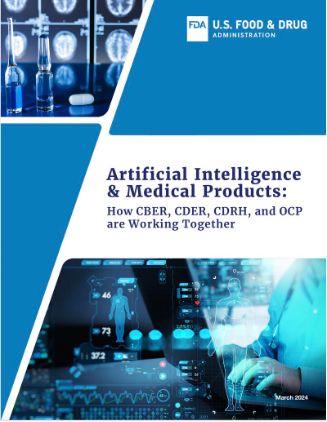
“These devices present a number of psychological risks including depression, anxiety, worsening of underlying symptoms, development of post-traumatic stress disorder, and physical risks such as pain, burns, and tissue damage.”

“These devices present a number of psychological risks including depression, anxiety, worsening of underlying symptoms, development of post-traumatic stress disorder, and physical risks such as pain, burns, and tissue damage.”

“Artificial Intelligence and Medical Products: How CBER, CDER, CDRH, and OCP are Working Together” outlines how FDA’s medical product centers plan to address regulation of AI used in medical products and their development.

“We’ve arrived at a historically strong rule that will protect the most exposed communities from toxic air pollution while also ensuring that there will be a process that safeguards our nation’s critical supply of sterilized medical equipment.”

The new draft guidance proposes select updates to the FDA guidance document “Cybersecurity in Medical Devices: Quality System Considerations and Content of Premarket Submissions” and focuses on information FDA considers necessary to support obligations under section 524B of the FD&C Act, “Ensuring Cybersecurity of Devices.”

Post-market surveillance plays a critical role in the UK’s medical device regulatory framework. Manufacturers must prioritize establishing a comprehensive PMS system, developing clear and organized PMS plans, and promptly reporting incidents and corrective actions.

Medical Electronic Products of the future will be largely free from wires and cables, aside from a power source. “Wireless medical devices” offer numerous advantages. However, they are also subject to extensive legal regulations governing aspects such as the radio technology used in them. In addition, they may have to be assessed by a Notified Body such as TÜV SÜD.

Leading hospital systems are advocating for “immediate transition” to digital communication to manage supply chain disruptions and enhance patient safety.

Following a “alarming” increase in medical device submissions containing unreliable data, the FDA is reminding manufacturers and study sponsors that they are responsible for qualifying third-party test labs and closely scrutinizing all testing data.

LNE-GMED UK has been designated as a UK Approved Body to assess and certify general medical devices in accordance with Part II of the UK Medical Devices Regulations 2002. Scarlet NB UK has been designated with a focus on assessing and certifying software and AI as a medical device (AI/SaMD).

Orthogonal worked with Brian Binkowski, to gain a clearer picture of the state of SaMD approvals in the U.S. Following is what they learned about the rate of FDA approvals and clearances and which companies are having the most success getting their products cleared for the U.S. market.